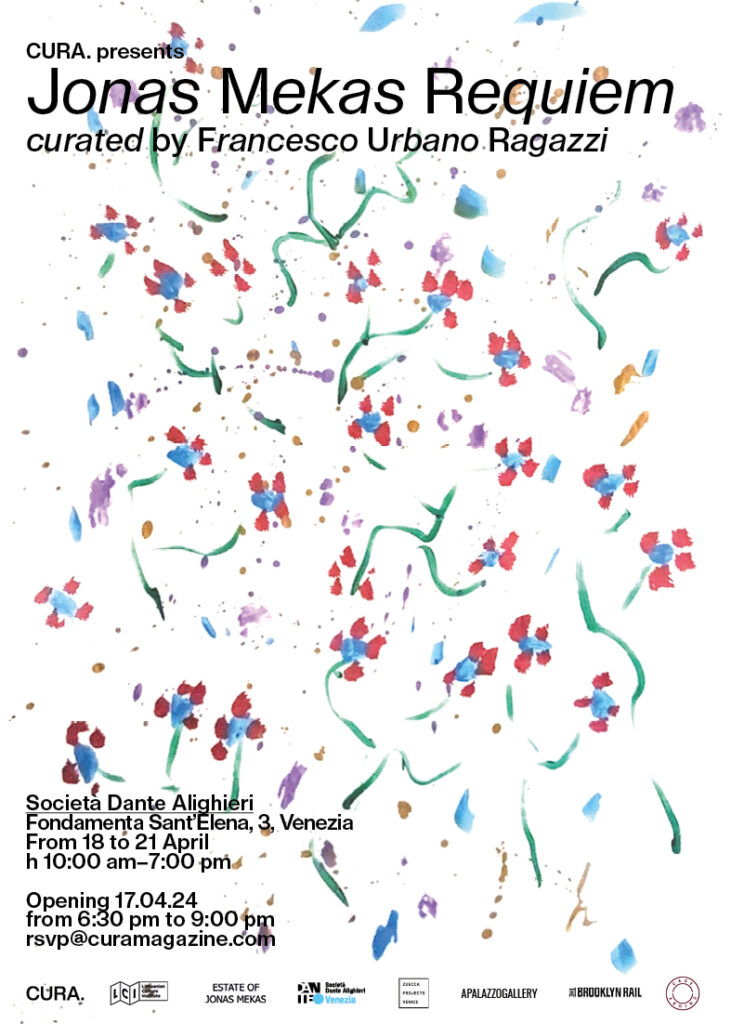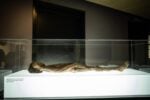Jonas Mekas – Requiem

Mostra personale.
Comunicato stampa
Jonas Mekas. REQUIEM
Curated by Francesco Urbano Ragazzi
European première in conjunction with the LX Biennale d’Arte di Venezia
Fondamenta Sant'Elena 3, Venezia.
Opening: 17 April, 6,30 pm – 9:00 pm
From 18 to 21 April, 10:00 am – 7:00 pm
CURATORS STATEMENT
No, this is not a spectacle.
This is a walk. This is Venice.
The pine trees, the grass, the lagoon.
Two cats, a bench, the stadium, the church of Sant'Elena Imperatrice.
In the middle of the journey, the world.
A land without promises under the changing sky.
An artwork that continues to live.
A cinema without seats in a school for foreigners.
A school for being foreigners.
All foreigners. Always Foreigners.
PRESS RELEASE
During the opening week of the LX Venice Biennale, CURA presents REQUIEM, the final masterpiece by the Lithuanian-born filmmaker Jonas Mekas (Semeniškiai 1922 – New York 2019). Curated by Francesco Urbano Ragazzi as part of the European première of the work, the project takes place just a few steps away from the Giardini della Biennale in an extraordinary location that opens its doors to contemporary art for the first time, Società Dante Alighieri. The project is made possible thanks to the support of the Estate of Jonas Mekas, the Lithuanian Culture Institute, and Zuecca Projects in collaboration with Apalazzo Gallery and Case Chiuse by Paola Clerico with the media partnership of The Brooklyn Rail.
REQUIEM is the last film made by Jonas Mekas during his lifetime and can be considered as his farewell to earthly life. Projected on two synchronized screens, a kaleidoscope of images reverberates endlessly, allowing the wonder of nature to reveal itself in its infinite beauty. Flowers of every shape and color, trees swaying in the wind, meadows, and leaves were captured by the artist over the last thirty years of his existence using various digital mediums, from his first Sony camcorder to an ultracompact Nikon. However, what the viewers see unfolding before their eyes is not merely a depiction of earthly paradise. At times, the floral imagery alternates with tragic scenes of wars, fires, and floods captured by Mekas’s camera from a distance, on television screens or newspapers. Rather than an Eden, the planet immortalized in the work appears to be the one that survived the great Flood. More than a meditation on death, the artist seems to offer a vision of life after the Anthropocene, at the end of human life.
The soundtrack to Jonas Mekas’s video installation is Giuseppe Verdi’s Requiem Mass, composed for the death of the writer Alessandro Manzoni in 1874, but in-real-time recorded sounds overlay the choir and orchestra at certain points. Thus, the images become both a celebration and a counterpoint to the solemnity of this cornerstone of Italian Romanticism in music.
As is typical in the films of this independent cinema poet, transcendence and reality do not move on separate planes but blend until they coincide. Despite the dizzying symbolic charge of the work, REQUIEM can also be viewed as a herbarium where floral varieties are represented with botanical precision. Among the flowers that appear on screen, the discerning eye recognizes some very special ones. In vases displayed on terraces or in New York parks, Mekas often captures with his video camera the species typical of Lithuania, the land he was forced to leave in 1944 after the Soviet occupation. The search for those plants is thus part of an exercise in rooting that the artist never ceased to undertake since arriving in the United States as a refugee in 1949.
The experience of exile from one’s homeland – one of the axes around which Mekas’s filmic quest revolved – is evoked not only by REQUIEM but also by the location in which the work is presented on this occasion. While the film was originally created for The Shed in New York, in its Venice première, the video installation is exhibited in the halls of the Società Dante Alighieri, the only institution authorized to issue language diplomas to immigrants seeking Italian citizenship. Through a short walk from the Giardini della Biennale to Sant’Elena, a hidden corner of the city’s life is revealed. The Dantean journey filmed by Mekas ideally blossoms within the walls of an institution that symbolizes language and culture as agents of social transformation. Thus, the project responds to the theme chosen for this year’s Biennale: Stranieri Ovunque – Foreigners Everywhere.
The itinerary that REQUIEM outlines within the city proposes an escape from the standard stages of tourism and glamourous events to rediscover art in the space of reality. This continues the journey undertaken by Francesco Urbano Ragazzi together with Jonas Mekas in 2015 with the exhibition The Internet Saga at Palazzo Foscari Contarini, a dogal palazzo converted into a fast-food restaurant. Along this route of exhibition projects, new dimensions of the city have been revealed over the years: from Teatro Italia with Hillary. The Hillary Clinton Emails by Kenneth Goldsmith to the Casa di Reclusione Femminile della Giudecca with Adoration by Pauline Curnier Jardin. REQUIEM by Jonas Mekas at the Società Dante Alighieri is a passionate homage to the initiator of this journey and an invitation to new drifts.
To accompany this imaginative movement, a selection of publications from CURA’s extensive catalog will be available inside the space, along with the volume Jonas Mekas, Images Are Real edited by Francesco Urbano Ragazzi, which the publishing house released on the occasion of the artist’s centennial.
BIOGRAPHIES
Jonas Mekas (Semeniškiai, 1922 - New York, 2019) was a Lithuanian filmmaker, poet, and artist whose films are considered milestones of independent cinema worldwide. In 1944, Jonas and his brother Adolfas were deported by the Nazis to the Elmshorn labor camp in Germany. At the end of 1949, the International Refugee Organization brought them both to New York, where they settled in Williamsburg, Brooklyn. Thanks to his friendship with fellow countryman George Maciunas, Mekas soon became active in the Fluxus group.
In 1949, two months after he arrived in New York, he bought his first Bolex camera. He soon became deeply immersed in American avant-garde film. In 1954, he founded the magazine Film Culture, which quickly became the most important film publication in the United States. In 1958 he started the legendary “Movie Journal “column in The Village Voice. At the end of 1960, he signed the New American Cinema Manifesto, which brought together an entire generation of independent filmmakers, such as Stan Brakhage, Jack Smith, Kenneth Anger, and Andy Warhol. Developing the ideas expressed in the manifesto, Mekas founded the Filmmakers’ Cooperative in 1962 and the Filmmakers’ Cinematheque in 1964. The last organization would eventually become the Anthology Film Archives, one of the world’s largest and most important avant-garde film archives.
Jonas Mekas is widely recognized as one of the initiators of the film-diary genre. His second film, The Brig, received the 1963 Grand Prix Leone di San Marco at the Venice Film Festival. His filmography includes masterpieces such as Walden (1969), Reminiscences of a Journey to Lithuania (1972), Lost, Lost, Lost (1976), As I Was Moving Ahead I saw Brief Glimpses of Beauty (2000), A Letter from Greenpoint (2005), Sleepless Nights Stories (2011), and Out-takes from the Life of a Happy Man (2012). His works have been exhibited at major international contemporary art events: from Documenta XI and XIV to La Biennale di Venezia (Utopia Station in 2003; Lithuanian Pavilion in 2005). In the last 15 years, retrospective exhibitions on Mekas have been organized in the world’s most important museums, including Museum Ludwig (Cologne 2008), Serpentine Gallery (London 2012), Centre Pompidou (Paris 2012), MUAC (Mexico City 2013), Hermitage Museum (St. Petersburg 2013), MMCA (Seoul 2017), Jewish Museum (New York 2021), National Gallery of Art (Vilnius 2021).
Francesco Urbano Ragazzi is a duo of curators founded in Paris in 2008 and composed of Francesco Urbano (PhD) and Francesco Ragazzi (PhD). The team is known for organizing exhibitions of significant contemporary artists in spaces of everyday life. Just to mention the projects of the series carried out in Venice during the Biennale Arte: The Internet Saga with Jonas Mekas at Palazzo Foscari Contarini (2015), Hillary. The Hillary Clinton Emails with Kenneth Goldsmith at the Cinema Teatro Italia (2019), Adoration with Pauline Curnier Jardin inside the Women's prison on the Giudecca island (2022). Francesco Urbano Ragazzi has also organized exhibitions in or for international institutions such as MMCA (Seoul), Kunstnernes Hus (Oslo), ISCP (New York), CERN (Geneva), Bucharest Biennale, Maraya Art Centre (Sharjah), Reykjavik International Film Festival, Centre d'Art Contemporain Genève, La Loge (Brussels), La Casa Encendida (Madrid), Institut Français (Paris), Ikon (Birmingham), Futura (Prague), Ruya Foundation (Baghdad), Emirates Foundation (Abu Dhabi). In 2022, Francesco Urbano Ragazzi was the artistic director of the seventeenth edition of LIAF, Scandinavia's longest-running contemporary art biennial. Between 2022 and 2023, the duo curated Jonas Mekas 100! in Italy, the international program to celebrate the centenary of the Lithuanian filmmaker's birth. On that occasion, they edited the catalog Jonas Mekas. Images Are Real published by CURA Books.



